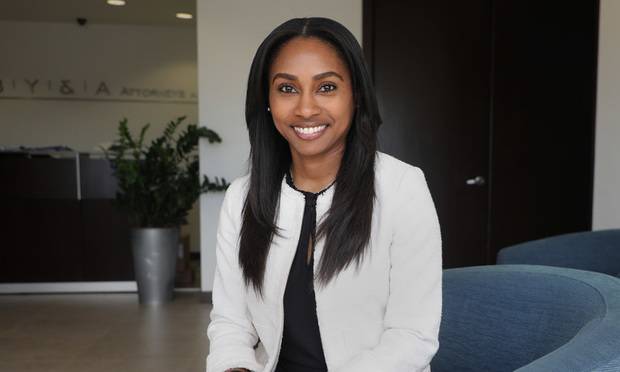Diversity in the Legal Profession Is a Great But Frustrating Goal
The legal profession talks a lot about diversity and goals for reaching parity, but it's sometimes hard to detect progress.Coral Gables attorney…
January 31, 2018 at 12:14 PM
6 minute read

The legal profession talks a lot about diversity and goals for reaching parity, but it's sometimes hard to detect progress.
Coral Gables attorney Tiffany Hendricks is the only black woman at her 21-attorney law firm, which is 29 percent female.
“I definitely feel like it's still a very white-male-dominated profession, and I don't think I get any perks for being a black woman at all,” said the litigation and corporate associate at Perlman, Bajandas, Yevoli & Albright.
On the gender front, a 2016 Florida Bar survey of female attorneys offered cringe-worthy examples of widespread sexism in the justice system, with 43 percent of respondents reporting personal experience with gender bias. On the financial side, the survey found just 18 percent of equity partners at major law firms are women, indicating a gender penalty is in play on promotions.
“There definitely is some good ol' boy mentality in the legal profession,” Hendricks said, and she senses lingering sexism in court. “I've never had any judge say anything ridiculous to me.” But higher-ups have assigned her to appear before a male judge who's considered a flirt and, she's been told, would like to see “a pretty face.”
In some ways, she considers that part of the territory.
“If you're going to be a lawyer, you've got to be tough,” said Hendricks, who joined the firm in October 2015 after starting as a law clerk. “We're paid to battle.”
The 85-attorney Roig Lawyers, which is known for its insurance defense litigation work, is a diversity exemplar in South Florida, leading in the top measures of diversity in a report published by the Daily Business Review last June.
The Deerfield Beach-based firm ranked highest in the percentage of female attorneys at 55 percent, female partners at 26 percent, female associates at 63 percent, minority attorneys at 44 percent and minority partners at 26 percent.
Roig attorney Julie Harris Nelson in Miami is a member of the Florida Bar's diversity and inclusion committee. She said the firm has no diversity committee, but she credits the example and core values set by founding partner Fernando Roig.
“You have a lot of the individual attorneys that participate in many different organizations that have a goal of diversity and inclusion in mind,” said Nelson, an African-American partner in her ninth year at the firm. “We take pride in going out to the community, and we're a part of the community.”
Diverse attorneys know they can expect to get high-level courtroom experience at the firm, she said.
“We are not afraid to show and express our diversity in the courtroom,” she said. “A lot of times, you will see many of our lawyers, female lawyers in particular, going in and trying cases and arguing motions for summary judgment. That's isn't something that is delegated to just a small group of people.”
The 49-attorney Siegfried, Rivera, Hyman, Lerner, De La Torre, Mars & Sobel has three South Florida offices in Coral Gables, Plantation and West Palm Beach. The firm has found that attorneys with diverse backgrounds are attracted by flexible employment arrangements and the firm's ability to demonstrate a track record of success for minorities.
For example, the firm accepted 31-year-old attorney Nicole Kurtz's request to keep her as a full-time attorney after she moved from Miami to Orlando even though the firm doesn't have an office in Central Florida. And senior associate Ivette Blanch, who is in her early 30s, transitioned at her request to part-time status after becoming a mother.
NATIONAL LEADERS
Newly designated Bilzin Sumberg managing partner-elect Albert Dotson Jr. and Greenspoon Marder chief diversity officer Evett Simmons, both African-Americans, have been longtime diversity leaders. Their roles include Dotson's service as chairman of 100 Black Men of America and Simmons' term as president of the National Bar Association, the nation's largest national network of African-American attorneys.
Both see diversity as very much a work in progress.
“Focusing on diversity is never an objective we achieve,” Dotson said. “It's something that you live by and constantly try to improve to reflect the community in which you're doing business. It's not something that we say we achieved 10 years ago.”
Simmons conceded, ”I'm frustrated to be honest with you.” Thinking back to her bar association leadership in 2000, she said, “It's like we're going backward instead of forward.”
Jackson Lewis principal Pedro Torres-Diaz in Miami, immediate past president of the Hispanic National Bar Association, said he shares Simmons' frustration.
“If you ask the national presidents of all the diverse bars, I think they will tell you the same thing,” he said, noting Latinos represent only 4 percent of all lawyers compared with 17 percent of the population.
Torres-Diaz is focused on retention rates and opportunities at Big Law firms and in-house law posts. He wants mentoring to be replaced by championing to ensure advancement. And he's counting on CEO Action for Diversity & Inclusion, an executive-driven diversity group, to force law firms to be more accountable on diversity.
All three former leaders of national diversity groups are still pushing, and the legal pipeline is a key vehicle.
”A key thing that we try to do is deal with the pipeline because if you can't get people of color into the pipeline, then it's kind of hard to get them into the firms,” Simmons said.
For the 17 years since she was NBA president, the firm has sponsored a summer law camp at Howard University, and the mock trial competition bears Simmons' name. She helped start a scholarship program through the Sarasota Community Foundation for law students, and one recipient became as associate at the firm.
Even if the pipeline doesn't deliver new attorneys to Greenspoon Marder, she said, “If they have an opportunity to broaden their horizons to better reflect the community we serve, then we are ahead of the game.”
Bilzin Sumberg ranked second among South Florida law firms in key measures in the DBR's 2017 diversity special report. Dotson noted his firm participates in the Street Law program partnering law firms with diverse high school law classes and offering the potential for more when students show a strong interest in pursuing legal careers.
Hendricks said her minority friends in law are “tired of the diversity talk” and in part see it as a generational problem with attorneys in their late 40s and older. She believes younger attorneys “are just attuned to equality in general” and can't wait to put issues of gender and minority diversity behind them.
This content has been archived. It is available through our partners, LexisNexis® and Bloomberg Law.
To view this content, please continue to their sites.
Not a Lexis Subscriber?
Subscribe Now
Not a Bloomberg Law Subscriber?
Subscribe Now
NOT FOR REPRINT
© 2025 ALM Global, LLC, All Rights Reserved. Request academic re-use from www.copyright.com. All other uses, submit a request to [email protected]. For more information visit Asset & Logo Licensing.
You Might Like
View All
Are Counsel Ranks Getting 'Squeezed' as Nonequity and Associate Pay Grows?
5 minute read

'So Many Firms' Have Yet to Announce Associate Bonuses, Underlining Big Law's Uneven Approach
5 minute read
Elite Boutiques Competing More With Big Law Bonuses, With Several Going Above Market
9 minute readTrending Stories
- 1Law Firms Expand Scope of Immigration Expertise, Amid Blitz of Trump Orders
- 2Latest Boutique Combination in Florida Continues Am Law 200 Merger Activity
- 3Sarno da Costa D’Aniello Maceri LLC Announces Addition of New Office in Eatontown, NJ, and Named Partner
- 4Friday Newspaper
- 5Public Notices/Calendars
Who Got The Work
J. Brugh Lower of Gibbons has entered an appearance for industrial equipment supplier Devco Corporation in a pending trademark infringement lawsuit. The suit, accusing the defendant of selling knock-off Graco products, was filed Dec. 18 in New Jersey District Court by Rivkin Radler on behalf of Graco Inc. and Graco Minnesota. The case, assigned to U.S. District Judge Zahid N. Quraishi, is 3:24-cv-11294, Graco Inc. et al v. Devco Corporation.
Who Got The Work
Rebecca Maller-Stein and Kent A. Yalowitz of Arnold & Porter Kaye Scholer have entered their appearances for Hanaco Venture Capital and its executives, Lior Prosor and David Frankel, in a pending securities lawsuit. The action, filed on Dec. 24 in New York Southern District Court by Zell, Aron & Co. on behalf of Goldeneye Advisors, accuses the defendants of negligently and fraudulently managing the plaintiff's $1 million investment. The case, assigned to U.S. District Judge Vernon S. Broderick, is 1:24-cv-09918, Goldeneye Advisors, LLC v. Hanaco Venture Capital, Ltd. et al.
Who Got The Work
Attorneys from A&O Shearman has stepped in as defense counsel for Toronto-Dominion Bank and other defendants in a pending securities class action. The suit, filed Dec. 11 in New York Southern District Court by Bleichmar Fonti & Auld, accuses the defendants of concealing the bank's 'pervasive' deficiencies in regards to its compliance with the Bank Secrecy Act and the quality of its anti-money laundering controls. The case, assigned to U.S. District Judge Arun Subramanian, is 1:24-cv-09445, Gonzalez v. The Toronto-Dominion Bank et al.
Who Got The Work
Crown Castle International, a Pennsylvania company providing shared communications infrastructure, has turned to Luke D. Wolf of Gordon Rees Scully Mansukhani to fend off a pending breach-of-contract lawsuit. The court action, filed Nov. 25 in Michigan Eastern District Court by Hooper Hathaway PC on behalf of The Town Residences LLC, accuses Crown Castle of failing to transfer approximately $30,000 in utility payments from T-Mobile in breach of a roof-top lease and assignment agreement. The case, assigned to U.S. District Judge Susan K. Declercq, is 2:24-cv-13131, The Town Residences LLC v. T-Mobile US, Inc. et al.
Who Got The Work
Wilfred P. Coronato and Daniel M. Schwartz of McCarter & English have stepped in as defense counsel to Electrolux Home Products Inc. in a pending product liability lawsuit. The court action, filed Nov. 26 in New York Eastern District Court by Poulos Lopiccolo PC and Nagel Rice LLP on behalf of David Stern, alleges that the defendant's refrigerators’ drawers and shelving repeatedly break and fall apart within months after purchase. The case, assigned to U.S. District Judge Joan M. Azrack, is 2:24-cv-08204, Stern v. Electrolux Home Products, Inc.
Featured Firms
Law Offices of Gary Martin Hays & Associates, P.C.
(470) 294-1674
Law Offices of Mark E. Salomone
(857) 444-6468
Smith & Hassler
(713) 739-1250






